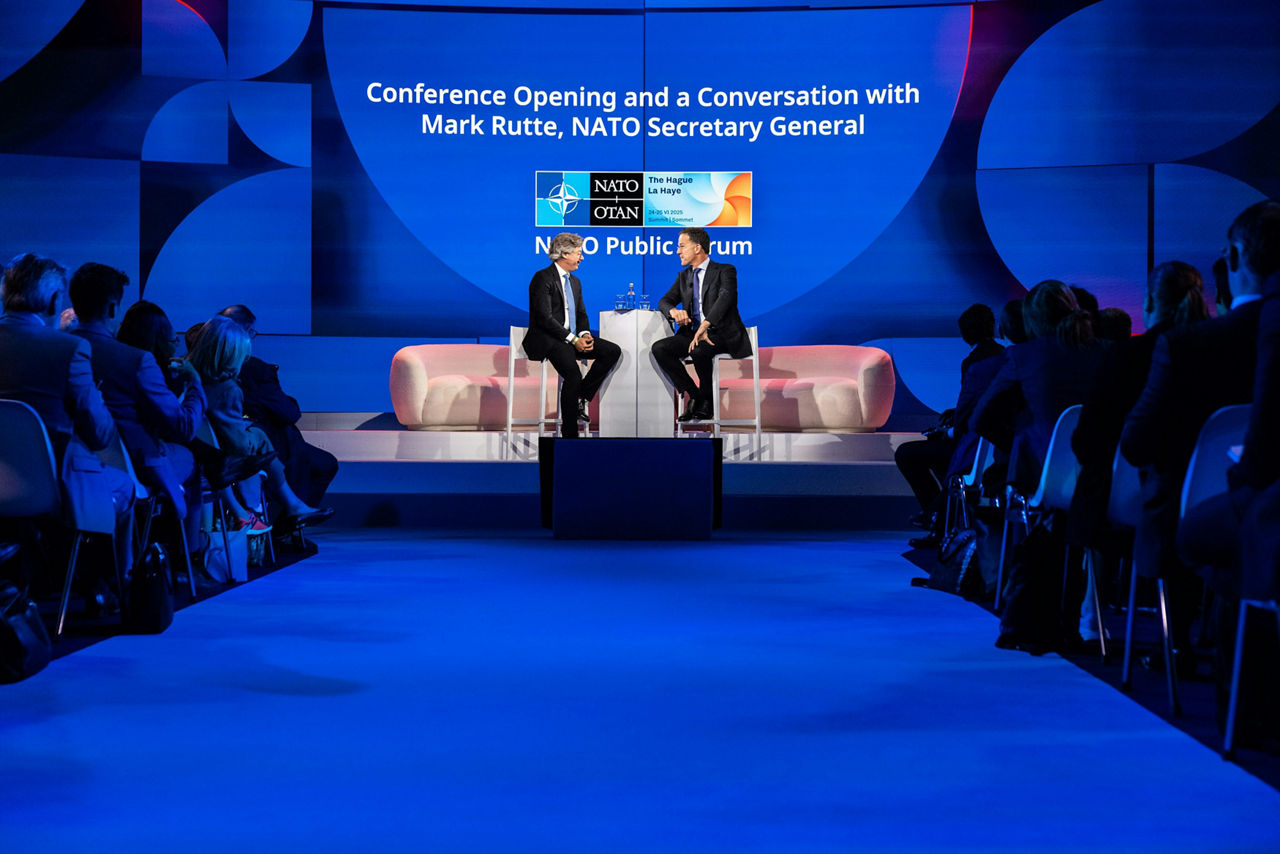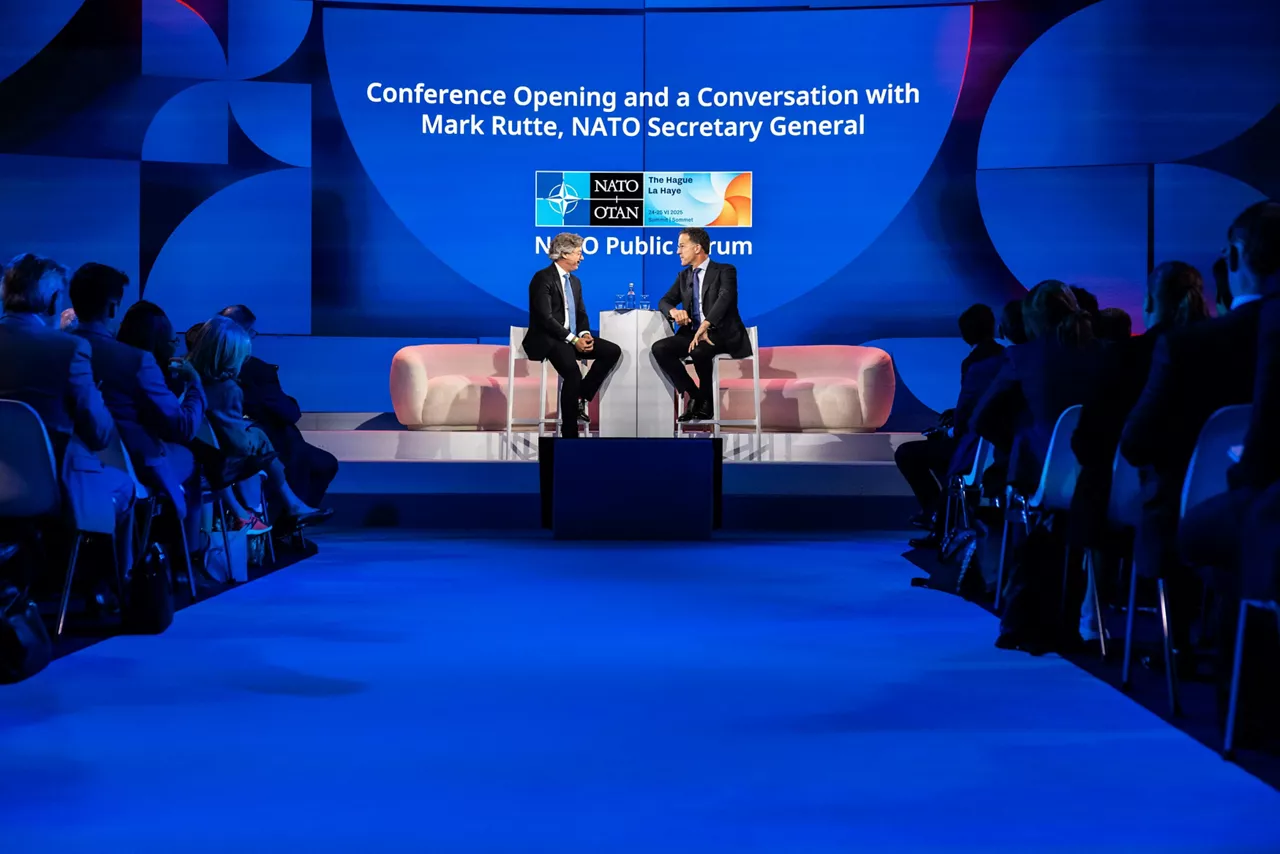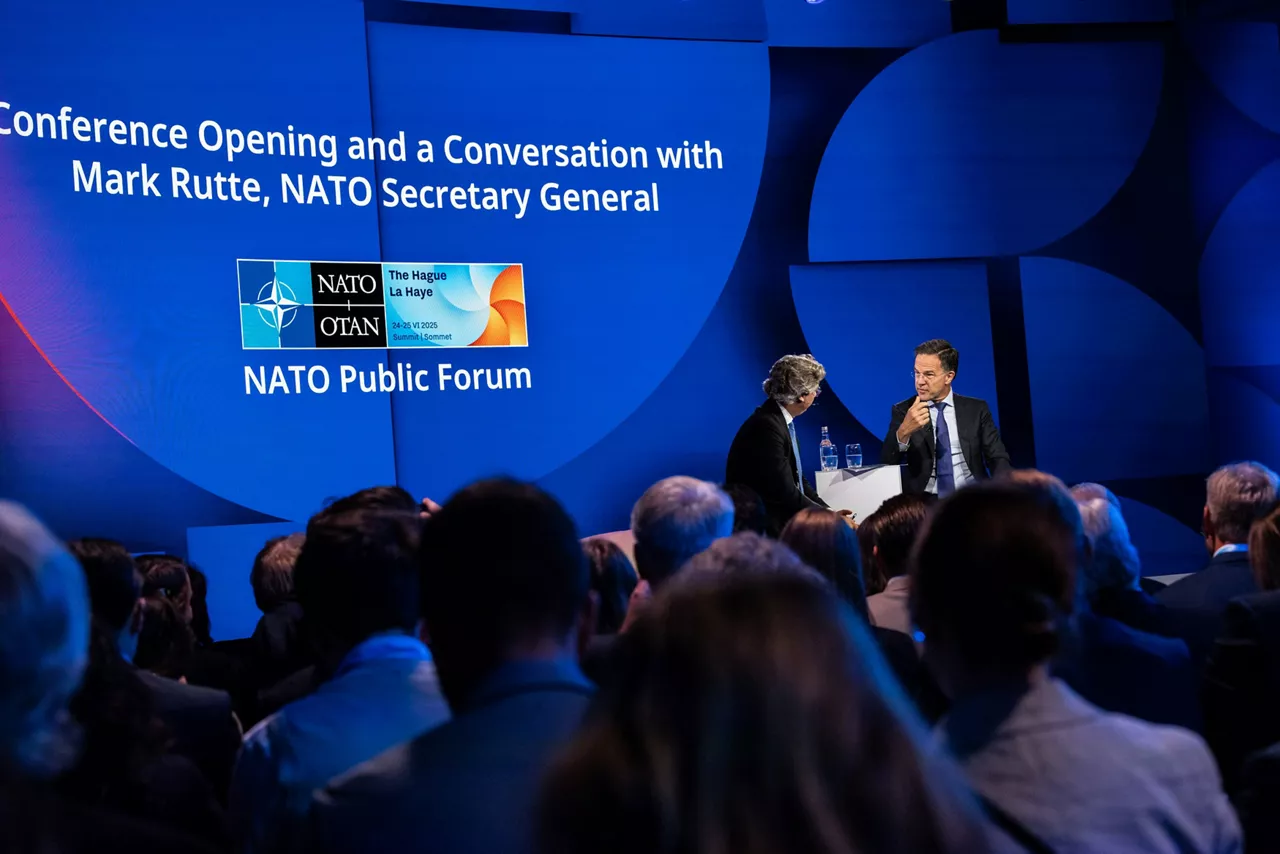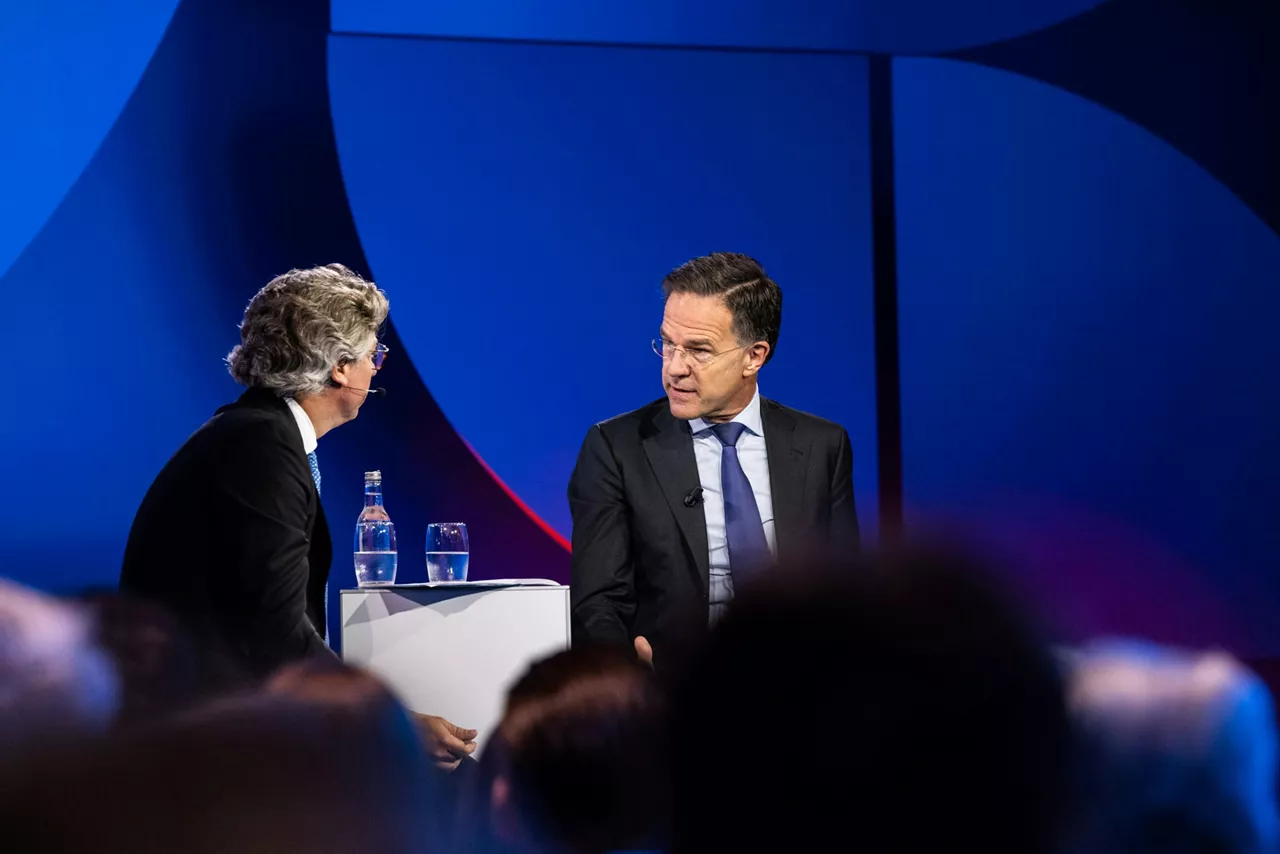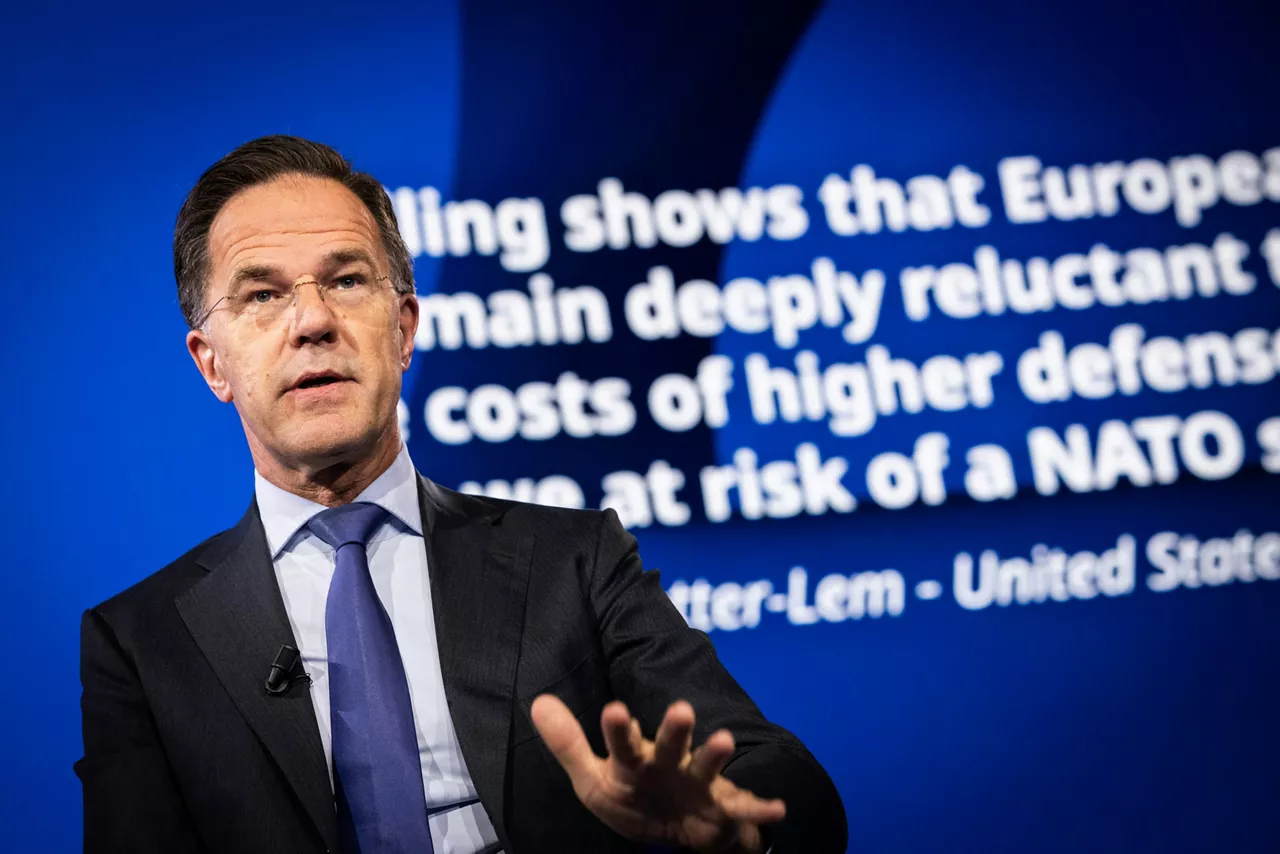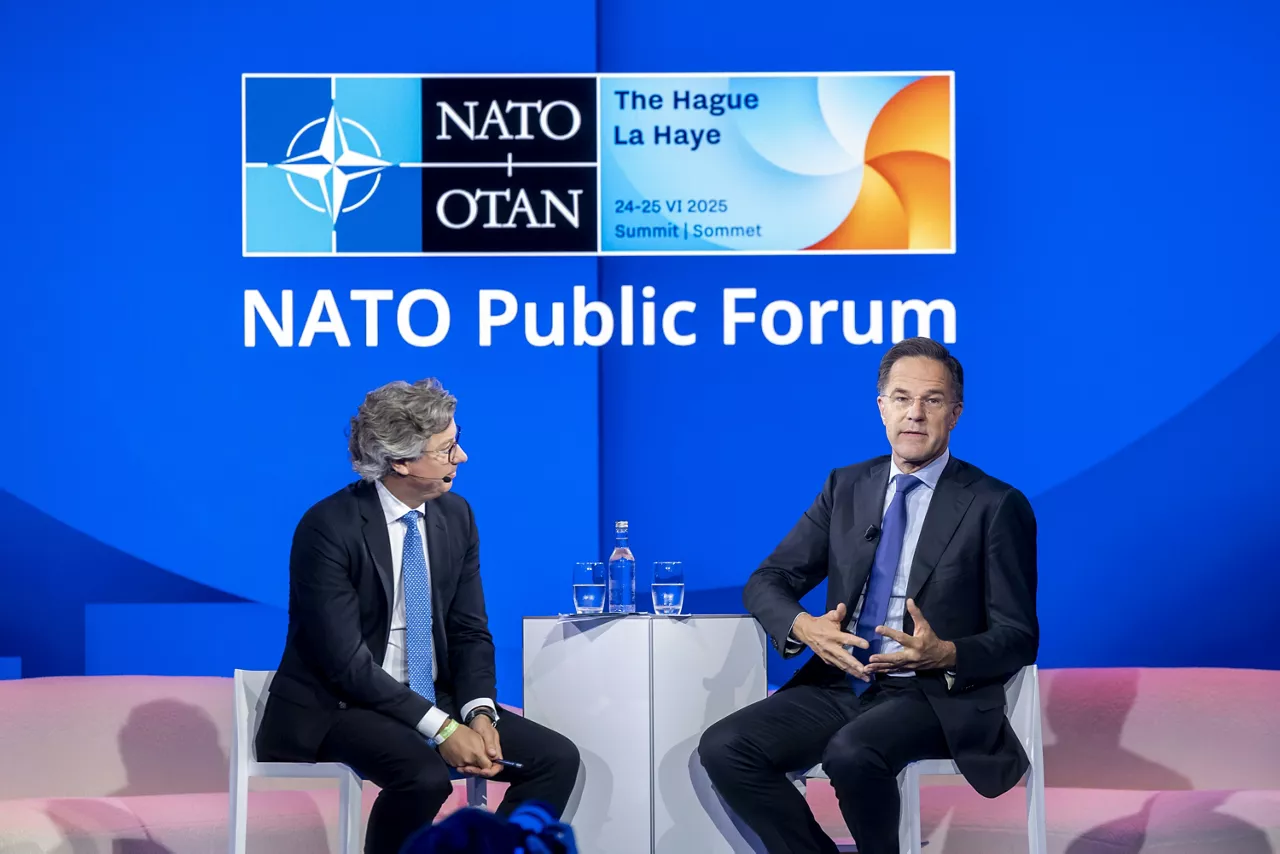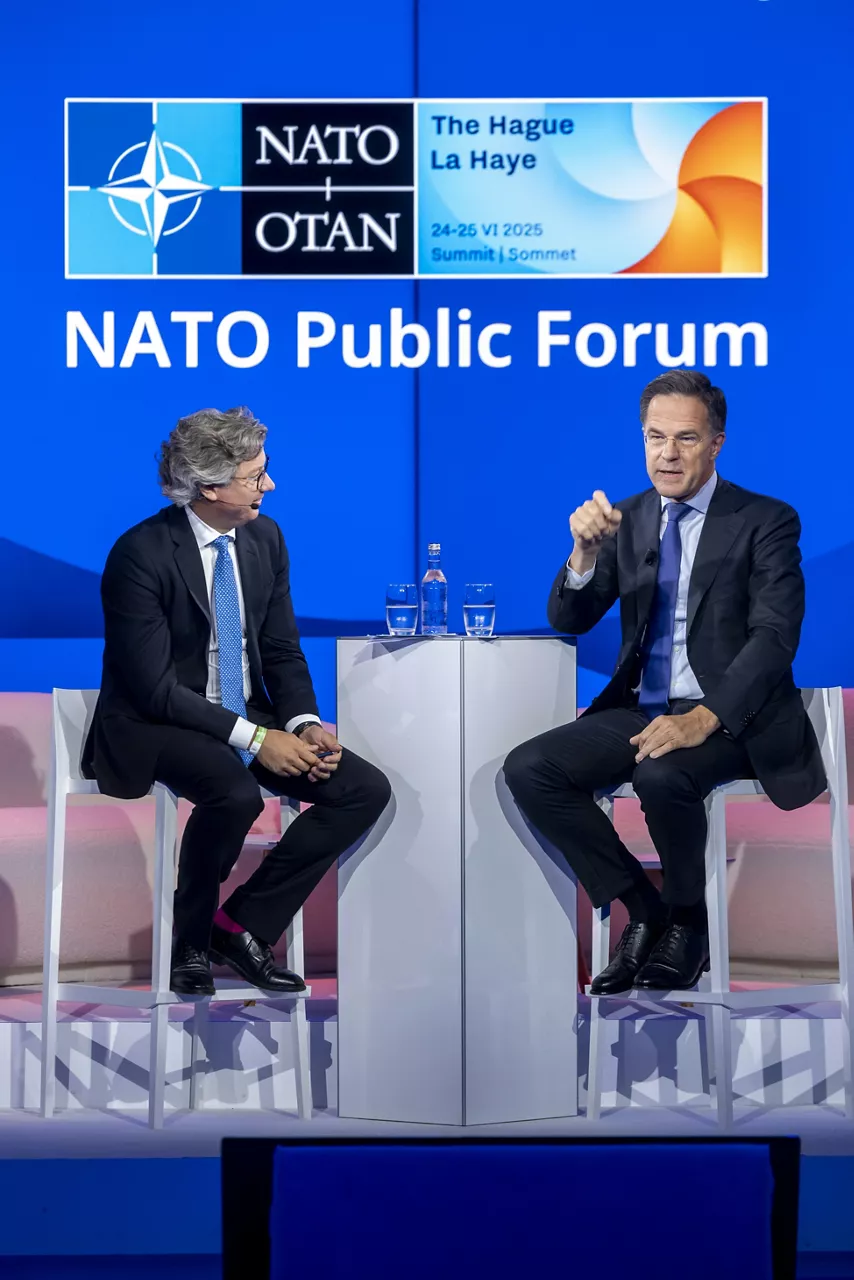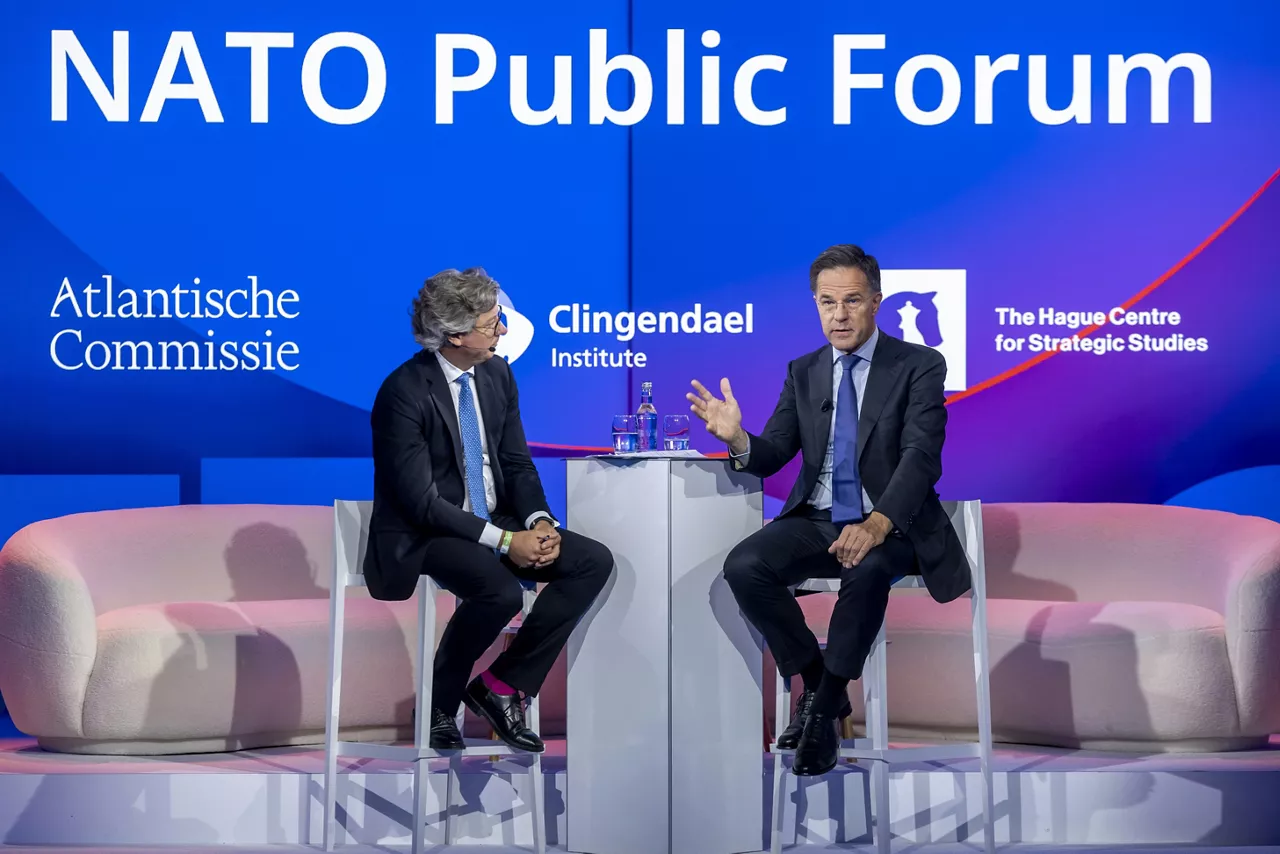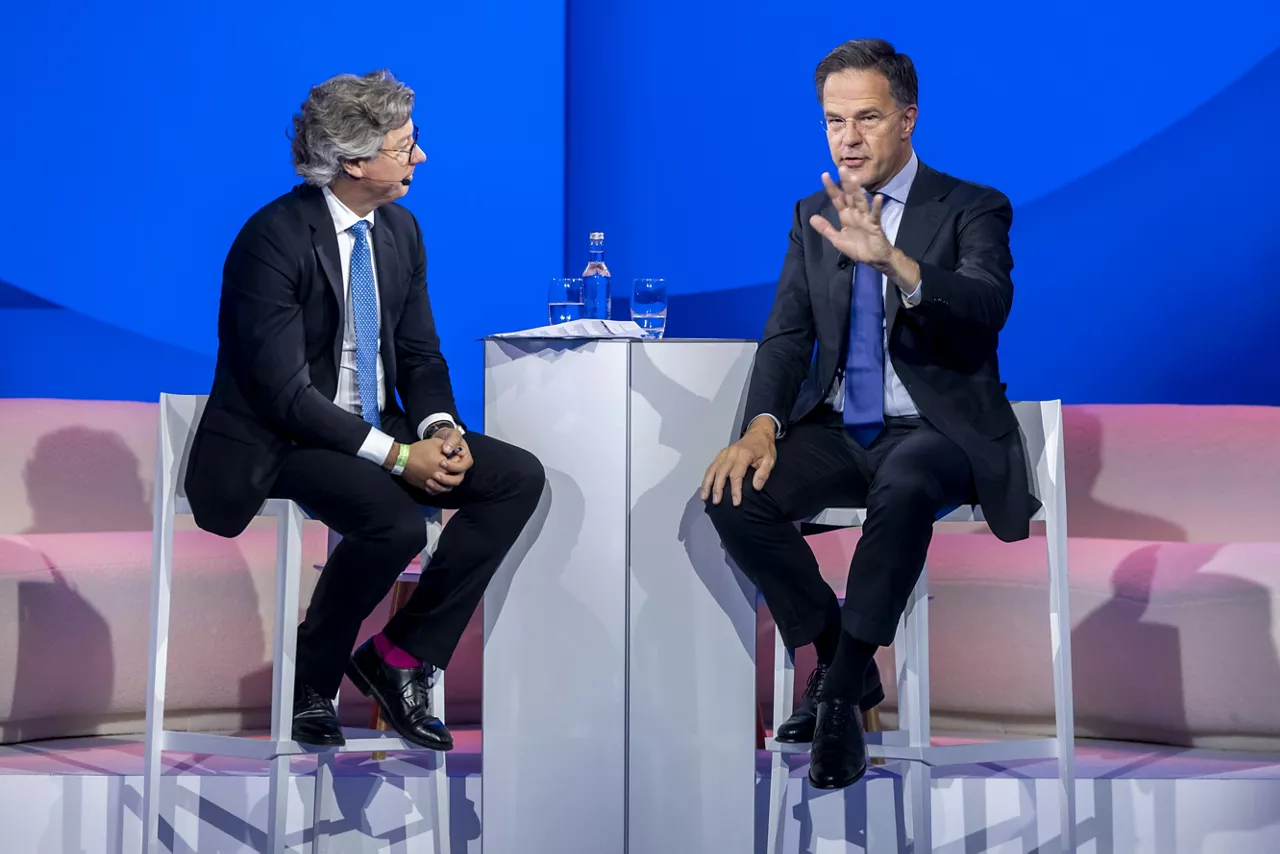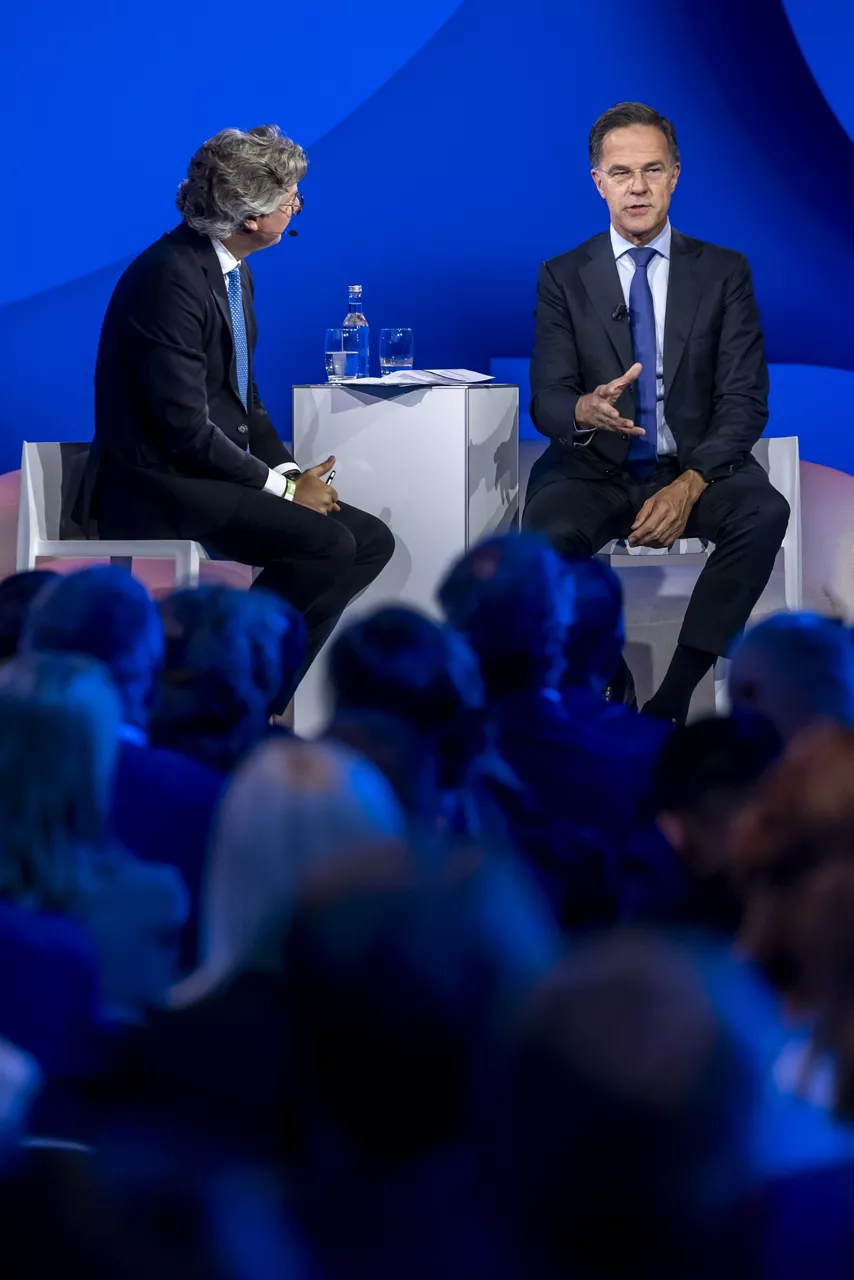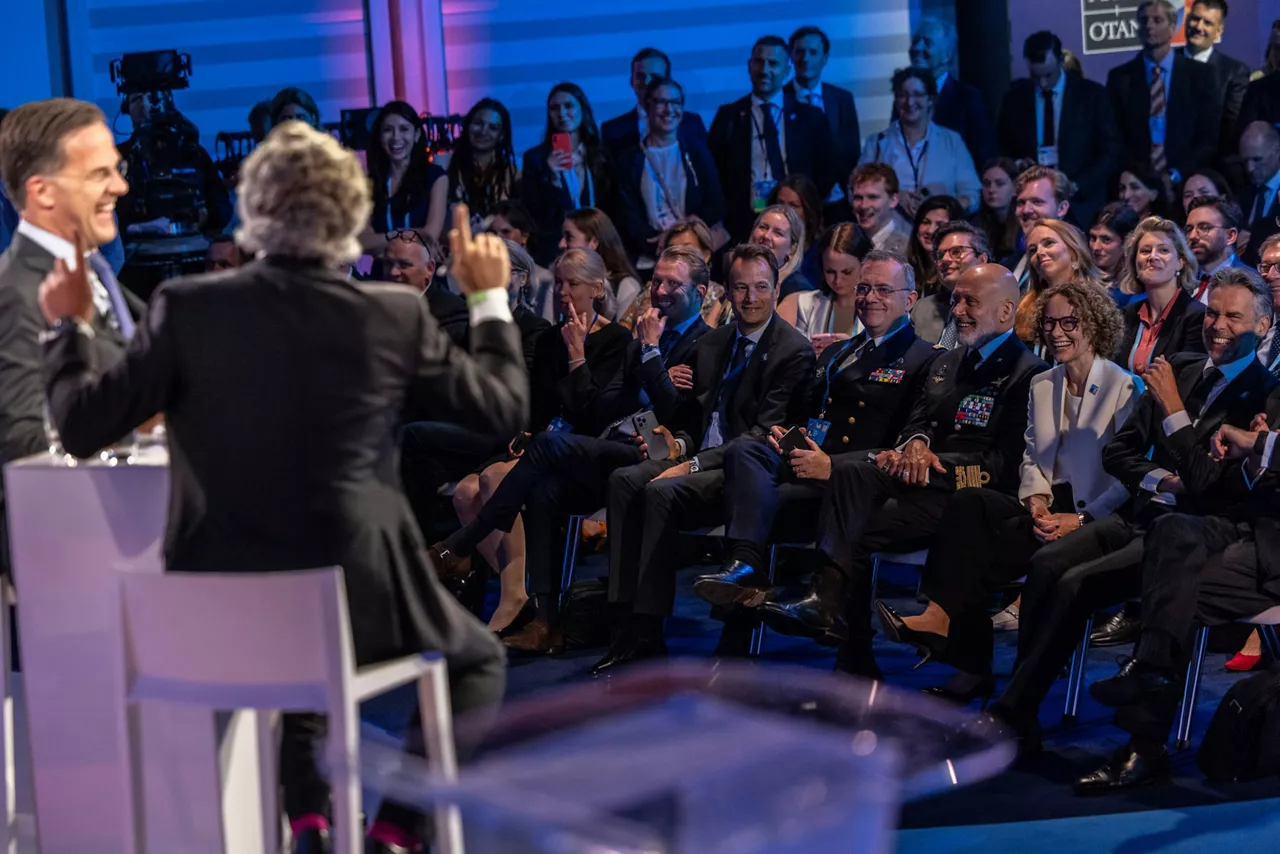Download NATO’s broadcast-quality video content free of charge

Log in
NATO MULTIMEDIA ACCOUNT
Access NATO’s broadcast-quality video content free of charge

Check your inbox and enter verification code
You have successfully created your account
From now on you can download videos from our website
Subscribe to our newsletter
If you would also like to subscribe to the newsletter and receive our latest updates, click on the button below.
Enter the email address you registered with and we will send you a code to reset your password.
Didn't receive a code? Send new Code
The password must be at least 12 characters long, no spaces, include upper/lowercase letters, numbers and symbols.
Your password has been updated
Click the button to return to the page you were on and log in with your new password.
(As delivered)
Donna Farizan, NATO Public Forum Master of Ceremonies
Welcome to the plenary stage here at the NATO Public Forum. To those of you entering in the room right now. Thank you so much for being here today and a warm welcome to our global audience tuning in online. I'm Donna Farizan and I am your Master of Ceremonies for today and tomorrow's plenary programme here at the NATO Public Forum. And it is a true honour to be here with you all today. We are now ready to officially kick off the day here at the NATO Public Forum, NATO's flagship public event taking place alongside the Summit of Heads of State and Government. We are joined by an incredible audience. As you can see, over 500 of you are in the room right now, and thousands watching from across the world to officially open today's proceedings. It is my great honour to welcome the Secretary General of NATO. You will be joined in conversation with Benedikt Franke, Vice Chairman and CEO of the Munich Security Conference. Take it away. Welcome.
Benedikt Franke, Moderator
That's the hot seat for you. Good morning, everyone. Thank you for joining us, not only here in the room, but as you've heard, the many people in large, large numbers, online across the Alliance. Goedemorgen. As somebody who knows a little about events, you could say, can I just start by congratulating the Public Diplomacy Division and the three Dutch partners for putting together quite a show. What a great public forum. I just hope all of you forget how smooth it was to get in here until you come to Munich in February. So to start us off this morning, we are honoured to have the Secretary General with us. We know this is probably the busiest day of the year, so thank you for taking 30 minutes out of your busy schedule. And it's particularly brave of you because other SGs that have sat down with me in the recent past have, hopefully temporarily, ended up as finance ministers in Norway, now desperately trying to find the money that you're calling for. May this destiny be spared for you.
Mark Rutte, NATO Secretary General
Norway, which has some money.
Benedikt Franke, Moderator
So let me tell you all how this is going to work the next 27 minutes and 20 seconds. I came prepared with many really clever questions.
Mark Rutte, NATO Secretary General
But you don’t need them [laughs].
Benedikt Franke, Moderator
Yes, and I don't have to, because your staff has just told me that a week ago, you asked citizens across the Alliance to hand in questions. Luckily for me, they're actually better than my own. Unluckily for you, they're actually harder. So I will warm you up with two questions before we get to the tough cookies,. And then we'll try to get through as many as we can in the remaining minutes. So Secretary General, you have taken the ‘take your work home’ approach to a totally new level. How does it feel to host your first ever Summit here in your hometown The Hague?
Mark Rutte, NATO Secretary General
I feel so proud that it is in my hometown. And some Dutch journalists think that this was very well prepared in 2022 when we started with NATO to have this lobby, to have the Summit. This was at the Madrid Summit, to have the NATO Summit in the Hague. We thought about the 75th in 2024. But the US basically said, ‘Well, no, never. That will go to Washington. You can get the one after in 2025.’ Okay, also fine. But I was not able to plan for a Summit and elections and for me become a Secretary General all at the same time. So yes, I'm a brilliant planner, but not so good. It feels really great to host the Summit here in The Hague. Now, not me personally it is now, of course, Dick Schoof doing it, the new Prime Minister, but I'm really proud. I live in this city. I was born in this city. I was raised in this city. I love this city. So it's very special.
Benedikt Franke, Moderator
Perfect. So central to the Summit is, and that is also very clever, The Hague Investment Plan, branding where everyone looks, as agreed by the Defence Ministers a little earlier this month. Talk us through the plan. Why is it important, and what does it mean for the Alliance?
Mark Rutte, NATO Secretary General
This is really important. And let me just highlight what happened yesterday: Germany announcing that Germany wants to reach the 3.5% of core defence spending, and therefore the overall 5%. Not in 2035, they want to reach it in 2029. Sweden announced last week they want to reach in the coming years the 3.5%. Norway, under the wise leadership, of Jonas [Gahr] Støre the Prime Minister, but also with the help of the Finance Minister, Jens Stoltenberg, we know him very well, will reach the 3.5 and therefore the 5% in the coming years. So these are the first announcements now coming in.
We know that countries like Poland and Estonia, Latvia, Lithuania, Finland, they are very close, already over the threshold. And many others will follow. So, and why is this important? Because we know that that Russia is reconstituting itself at a pace, at a speed which is really staggering and frightening. And so we have to stand ready. If we don't, we cannot defend ourselves in three to five years from now. Today, they know if they try anything, our reaction will be devastating, but we have to make sure that in three to five years they won't try. So if you want to prevent war, spend more. Peace through strength. We can put every label on it, but they are all true. So this is really historic.
Benedikt Franke, Moderator
Perfect. And I mean, we keep talking about defence spending, we also keep talking about the defence industry. And we've been talking about the defence industry for ages. What's different this time?
Mark Rutte, NATO Secretary General
What's different this time is that that it is serious. And that the defence industry now finally knows what we need. So in the past, when I came in October and we had a big meeting in November with the CEOs of the big defence industry companies in the beautiful residence in Brussels. They told me, ‘Yeah Mark, but we need 10-year contracts.’ I told them, we can't. Because in the US, you have a yearly cycle. In Europe, you will have election to election cycles. Forget about 10-year contracts.
But now what we have is the spending plans. We know the money is there. Take Germany again. They will more or less double their money spent on defence compared between 2021 and 2029. So that is from about 70 billion to about 150 billion. This is just one country in NATO doing this, so we know the money is there. And because we have finalised the NATO Defence Planning Process where Pierre Vandier who is sitting here as the Allied Commander Transformation. But of course, also the International Staff at Headquarters, with all the Allies, has worked very hard on this to assess what are the capabilities each of the allies need to deliver, if Russia or anyone else would attack us.
From there, we came to the conclusion that we needed this 3.5% core defence spending. So the industry now knows this. What we are seeing at the moment is that finally, but this can still be done at a more rapid pace, they are putting in the extra production lines, the extra shifts. But again, more needs to happen. We will have an industry forum later today. I’m constantly in contact with the defence industry. So I'm hopeful we will get there.
But the Russians are really doing this. As you know this figure that, I think it is for them the 152-ammunition, they are producing in three months what the whole of NATO is producing in a year. And they are 25 times smaller as an economy than the overall NATO economy. So this is not sustainable long-term. So we have to ramp that up. And you would might say, ‘Yeah but you also need drones and AI.’ Absolutely we will do all that. But every general is telling me, and please nod ‘yes’ that I’m right, that still when it comes to warfare, the base is stockpiles of ammunition, ammunition, ammunition. And yes, there we also need, of course, the drones and the AI and all the new technology.
Benedikt Franke, Moderator
You feel warmed up now? So, we'll go to the questions. So I think you'll see them back on the screen here. We'll try to get through as many of them as possible. The first one is from José Pereira from Portugal: “With the US strikes on Iran's nuclear sites alongside the Israel-Iran war, the Hamas-Israel conflict, the Ukraine-Russia war, how can NATO defend its allies?”
Mark Rutte, NATO Secretary General
NATO can defend its Allies by two things. One is a deal, a deal we struck in 1949 when NATO was established, as an attack on one will be an attack on all. But not just that. That's important, that's the Article Five. But what we have in NATO is the structures, the command structures, the intelligence structures, everything in place to back that up. So it's not just that I will tell you, ‘I will come to your rescue if you get attacked, and we will see then when it happens, how I will do that.’ We have everything in place, everything arranged, everything organised to make sure that we can do that.
So NATO was not established only to fight the Russians if they would attack us. They are our most immediate, long- term threats, immediate and long-term. But we also see China reconstituting itself. We see what China, North Korea and Iran are doing in supporting the war effort of Russia, the unprovoked war against Ukraine. So this is very serious business. Iran providing the drones technology to Russia and the drones themselves. And we see the impact they are having now in Ukrainian cities every day, killing innocent people. So this is all interconnected. So what we need to do is to make sure that we have the plans, the people, the money in place, and then we can protect our 32 Allies.
Benedikt Franke, Moderator
Perfect. You just mentioned people in place. Emmanuel Jacob from Belgium has asked how to translate increased defence spending in additional troop numbers, including better recruitment practices and retention policies.
Mark Rutte, NATO Secretary General
Very good question. Emmanuel. And this is happening as we speak in most NATO Allied countries. I know from my own country that the State Secretary here in this country is working on this day and night: how to make sure that you have actually the people in place to make it happen. You will see some countries moving to general conscription. Other countries are taking different views on this. Of course, this is for each Ally to decide how they will do this when it comes to the HR policies. But everything is geared to make sure that we have the troop numbers. We heard from Germany again, sorry that I come back to that example…
Benedikt Franke, Moderator
I like that!
Mark Rutte, NATO Secretary General
Yeah, and I know, and it's not to side with you.
Benedikt Franke, Moderator
But it is working. It's working.
Mark Rutte, NATO Secretary General
You're really very kind. But they need in the short-term, about an extra 60,000 troops. And longer term, it will be even more. So that means that you need a recruitment a process in place. You need to have the salary structures in place, the money, etc, etc. But of course, that's there now. Because if you spend not 70 billion, but the 150 billion, in the case of Germany on defence, then the money is there also to improve the salaries you pay to your men and women in uniform.
Benedikt Franke, Moderator
So Sean Cotter-Lem from the United States of America says: “polling shows that European publics remain deeply reluctant to paying these costs that you've just mentioned of higher defence spending. Are we at risk of a NATO say-do gap?”
Mark Rutte, NATO Secretary General
No, I would not agree with Sean on this because when you look at the latest opinion polling done in NATO, you see that many, many people, and it is getting to really high numbers, are supporting the fact that, yes, there is a direct threat from Russia. That yes, if we do not invest now, we are really at risk that the Russians might try something against NATO territory in three, five or seven years. And therefore there is large scale support. I see it in my own country. I've seen the polling data this morning in NSA newspaper in this country saying that there is now a majority of population really supporting the extra money spent on defence. Because this is the great thing about democracies. You cannot fool people. So the people living in this country and all other NATO Allies, they know that there is a change. That we are not living in happy lands after the Berlin Wall came down. We are living in much more dangerous times, and there are enemies, adversaries who might want to attack us. And we have to make sure that we defend our beautiful way of life and systems and our values.
Benedikt Franke, Moderator
In Munich, we love the elephant in the room, as you know from your many times there. There is, you know, a lot being said about our enemies, adversaries, rivals, but there also seem to be a few doubts about our friends. And let me pull up the next question. Maria Elena Guzman, from the United Kingdom and Spain: “how do you assess the reliability of the United States as a NATO Ally, and what steps can NATO take to maintain unity and trust within the Alliance?”
Mark Rutte, NATO Secretary General
This question I got many times, particularly since January, and basically were two questions. Question number one was, ‘Mark, is the US still with us?’ Yes, they are. You might want to turn on your television when Emmanuel Macron is visiting the Oval Office, when Keir Starmer is visiting the Oval Office, when Giorgia Meloni is, hey, by the way, when I was visiting, you might want to see that footage. There is total commitment by the US President and the US senior leadership to NATO.
However, it comes with an expectation. And the expectation is that we will finally deal with this huge ‘pebble in the shoe,’ this huge irritant, which is that we are not spending enough, as Europeans and Canadians. And they want us to equalise with what the US is spending. And when it comes to this famous 5% in the US is, well, basically they're there. When you look at what they spend on core but also on all the defence and security related investments. But they want to equalise what they're spending with us. And for us, of course, the main argument is not to equalise. Yes, that is important, because it is fair. But the real reason to do this, the first reason to do this, is the Russia threat. So these things come together.
And then the second question was, ‘Okay, so the US will stay with us. They are committed to Article Five. We believe you, Mark. But hey, then they might pull down the troop numbers in Europe without making pre-announcements. And SACEUR, our most senior commander in NATO might be a European, a Brit or German, leading the military side of the Alliance. There are many reasons why it is an American, because America is delivering all these enablers to NATO, also in Europe. So you want a US senior general to lead the military alliance on the military side.’ I said, ‘Well, okay, I don't think it will happen.’ And hey, guess what? The new Supreme Allied Command has been announced, and last time I checked his passport, it was US. So that didn't happen.
So my message to my European colleagues is, stop worrying so much. Start to make sure that you get investment plans done, that you get industrial base up and running, that the support for Ukraine remains at a higher level. Luckily, it is still today. I mean, this is what you should work on. And stop running around being worried about the US. They are there. They are with us.
Benedikt Franke, Moderator
There are definitely other places we need to be worried about. Next elephant in the room, Ukraine. Let me combine two questions. Here from the Netherlands, Vica Kolbeek says, with global attention shifting to the Middle East, how is NATO ensuring that Ukraine remains a priority? And later on, we have a question from Misha (inaudible), from Ukraine, how close are we to the solution of the Ukrainian conflict. And let me add a third bit to that question. We were fortunate enough to have the Ukrainian Foreign Minister with us yesterday at dinner at this wonderful Clingendael Institute…
Mark Rutte, NATO Secretary General
Andrii Sybiha was there? Oh, that's great.
Benedikt Franke, Moderator
Yes. So and he said that his great hope for the Summit, obviously, is that the President gets some face time, but also that there will be concrete commitments to Ukraine. So what can you already say? How close are we solution? Will there be concrete commitments? And will the Middle East shift have a negative impact?
Mark Rutte, NATO Secretary General
If we would not be able to deal with, yes, the Middle East, which is very big and commanding all the headlines, and Ukraine at the same time, we should [be] not in the business of politics and military at all. If we can only deal with one issue at a time, that would be... Then let other people take off. So I think we're all in this room and listening in, and the senior politicians and military people, are able to deal with two issues at the same time. I don't think that's too much to ask. And by the way, we can, and the evidence is there, because at this moment, the Europeans and the Canadians have pledged for this year, 35 billion in military support to Ukraine. Last year, it was just over 50 billion for the full year. Now, before we reach half year, it is already at 35 billion. And there are even others saying it's already close to 40 billion. The numbers I can now commit to are over 35. But I hope, of course, that the one saying it's close to 40 is right, but at least it is over 35, so that is fantastic news, and that means that the support for Ukraine is still at a level even higher than it was last year. And we also see a shift of the burden from the US more to the Canadians and Europeans, which I think is fair, that we take a bigger share of this burden as Europeans and Canadians from the United States.
When it comes to peace, I cannot predict when it will happen. I want to commend President Trump for breaking the deadlock. When he came in office, he started the dialogue with President Putin, and I always thought that was crucial. And there's only one leader who could break the deadlock originally, and it had to be the American President, because he is the most powerful leader in the world, and leading 25% of the world's GDP, and the mightiest and most powerful military in the world. So him doing that, breaking the deadlock was very important. But this doesn't mean that we are now getting to a deal immediately. It will take time, but it helps.
In the meantime, we have to make sure that Ukraine has everything to stay in the fight, that Ukraine is in the strongest possible position when real talks would start. So I'm not talking about these talks which this Russian historian is now leading, going back to 1,000 years ago, and then who was responsible for whatever, in Istanbul now, twice. This is not serious business. And I was very proud of the Ukrainians that they sent the senior team there, with the Foreign Minister, Defence Minister, the Chief of Staff, so they took this serious. But clearly Russia was not serious. But hopefully serious talks will start in the near future. And then we have to make sure that whatever the long-term ceasefire or the peace deal on Ukraine will be, that it is lasting, that it is durable. That Vladimir Vladimirovich Putin will never, ever again try to catch one square kilometre, or for the Americans, one square mile, of Ukrainian territory.
Benedikt Franke, Moderator
Let me add, yes, I think that deserves a round of applause. Let me add one more quick point on Ukraine, if I may.
Mark Rutte, NATO Secretary General
It's not on the list.
Benedikt Franke, Moderator
I know, you took my cards away, so, see what Andrii said yesterday is that for the past three years, or two and a half years, Ukraine, they've been security consumers within Europe, but they are slowly but surely turning into security producers. What is it that we at NATO, that you at NATO HQ, are learning from the conflict in Ukraine?
Mark Rutte, NATO Secretary General
Enormous, a lot. So we have this joint organisation now in Poland, JATEC, which is capturing all the lessons from the war. And of course, we are learning day in day out from what the Ukrainians are doing. We also are learning that and seeing that the Russians are copying what the Ukrainians are doing in two or three weeks. So it is a learning cycle, which basically takes two, three weeks at a time. It forces us, at NATO and in each Allied country to really reconsider, think through all our basic defence concepts compared to three and a half years ago. So that's one.
Second, don't forget, Ukraine is one of the biggest producers of weaponry in Europe. It has a huge defence industrial base. The problem is there is an untapped potential of about 35 billion dollars which they still could develop. And the good thing now is, we mentioned Jens Stoltenberg before and Norway, but that you also mentioned Denmark and Lithuania, that many countries who have seen their own stockpiles getting more and more depleted, are now also investing in this defence industrial base in Ukraine, so that Ukraine can therefore produce the weapons it needs to produce for the warfare. It's also helping them economically. It is helping them long-term, because their defence industrial base will be there after the war also, of course, for Europeans and other Allies to buy from.
Let's not forget, by the way, that Türkiye has a very big defence industrial base, we sometimes forget what they have. I have visited some of their companies, it's really impressive. That's one of the reasons we have to make sure that the Turkish defence industrial base is as closely connected as possible to the UK, Norway and European Union. Let's not have these fences drawn up within NATO, it won't help. But back to Ukraine. And then, of course, we have the Czech ammunition initiative, which started now one and a half year ago, in February 2024 and which is really successful, and making sure that 155-ammunition and other deliveries into Ukraine keep on going.
Benedikt Franke, Moderator
Let's go back to the questions. I'm not sure how the UK sneaked in a second question, but they did. How does the Secretary General, i.e. you, view the situation on the Alliance's southern border, given Russian influence in Africa, persistent conflict, climate change, fragile governments and migration.
Mark Rutte, NATO Secretary General
This is one of the reasons why we constantly have to do the 360 degrees. Because, as I said, our long-term direct threat is Russia. But it is not the only threat. There might be others. China is not having now four of its defence companies in the top 10 defence companies worldwide, only because of the parades in Beijing. They might want to do some stuff with their military capabilities going forward. And we know the risks we run with Taiwan. And that if that would happen that obviously, Xi Jinping will call his junior colleague in the Kremlin and tell him, ‘Hey, Vladimir, I backed you up so much now. And you know who is really in power in this relationship? It's not you, it's the one on this side of the line. Can you keep them busy in Europe?’ So that's China, Russia.
Then when it comes to the southern border, it's crucial, and this is something Spain and Portugal and Italy and Greece have consistently fought for, that NATO is very much concentrating on the southern border. We will, we're opening an office in Jordan. Of course, we have the NATO Mission in Iraq. We are helping in the G5 Sahel, Mauritania is a close partner, for example. We know that whole region, when we look at the map, China and Russia are rapidly, when it comes to Africa and the G5 Sahel, but also generally Africa, mid and north of Africa, the Chinese and the Russians are rapidly gaining influence. So let's not be naive. That's why we have a Special Representative, I personally have a Special Representative for the southern neighbourhood, no sorry for the South. And therefore southern neighbourhood and the southern flank. And he is constantly traveling, this guy who is really excellent, traveling all these countries and making sure that wherever NATO can help, we do.
Benedikt Franke, Moderator
Perfect. We've around five minutes left, two more questions, I think both of them...
Mark Rutte, NATO Secretary General
Who is coming after me?
Benedikt Franke, Moderator
The Prime Minister, the real Prime Minister.
Mark Rutte, NATO Secretary General
Then we can take more perhaps. No, no, I'm kidding.
Benedikt Franke, Moderator
So next question from Estonia, Eva Sula, how do we speed up the adoption of emerging and disruptive technologies, including for use in missions and operations?
Mark Rutte, NATO Secretary General
This is crucial. And as I said, Yes, this is all happening. But let's not forget about the base, and that's the ammunition. Because I'm really worried about ammunition. I'm happy that the UK is now building six new ammunition factories as part of their defence plans launched three weeks ago. But of course, when it comes to emerging and disruptive technologies, we have to be at the forefront here. Again, the war in Ukraine, the Russian war of aggression against Ukraine, is giving Ukraine and the whole of NATO a lot of insights when it comes to exactly this question.
We also know that, of course, this has an impact on cyber, on hybrid. It's one of the reasons why this is on the agenda today and tomorrow, hybrid, cyber, etc, to make sure that as an Alliance, we can not only fight the visible wars, but that we're also able to confront any adversary when it comes to that. And one of the things Pierre [Vandier] did together with Chris Cavoli, when on 25 December, we had this attack between Finland and Estonia about the sea cables, is that he brought together this Baltic Sentry activity, which is now sailing the Baltic Sea. The Russians hate it. They really hate it. So I love it. And this is basically to say, Well, ‘hey guys, you have all these merchant ships. They constantly lose their anchors, and then they have the anchor flap over the seabed for 100 miles. We might do a support mission into Russia to teach your commercial fleet how to sail those ships, because it seems to be very difficult for you guys if there is no other intention.’
And one of the things I learned with Baltic Sentry is when something is called an activity and not a mission, you do not need 32 approval. So I said, from now on, we only will have activities and no missions, because it speeds up the decision-making process. They brought together this whole activity, I should not say mission, in 10 days. And this was, I think one of the fastest deployed activities in NATO history.
Benedikt Franke, Moderator
Perfect. Italy has also somehow managed to sneak in two questions. I'm not going to take this one. I'm taking one that fits here. It says, in a world like today's, how does NATO plan to increase its defence against cyber-attacks and how specifically will artificial intelligence be used to pursue this target?
Mark Rutte, NATO Secretary General
Yeah, well, obviously this is key. So I've been personally speaking to technology experts on this, but of course, that's me as a historian trying to understand that new technology. Don't leave it with me. But obviously we have experts in NATO, in the military side, in the International Staff, in the Military Committee led by Admiral Dragone. So we have these experts in the building. And I think that's particularly crucial. And again, this is to the underlying issue of cyber, hybrid and making sure that we can defend ourselves and that our adversaries know, of course, what we do against them, I don't know. That's for Allies, but it is from them to us, that we stand ready and that we are not naive.
Benedikt Franke, Moderator
I've wondered how Italy sneaked in so many questions. Now I see the Admiral, now I know.
See, I think we have time for one very quick question and an even quicker answer. Justin Anthony Joven, from Canada. Do you think it'd be possible for a Canadian like me to become NATO Secretary General one day?
Mark Rutte, NATO Secretary General
Absolutely, Justin. I have no, it's not Justin Trudeau, I think, no, it's Justin Anthony.
Benedikt Franke, Moderator
Just asking for a friend.
Mark Rutte, NATO Secretary General
No, no, no, this is absolutely possible. I think there's sort of tradition that the NATO SecGen, I think is non-American. I was not sure, only European, I think so far it has not been Canadians, but the idea always has been, I think, from the start, that it is wise, because of the US presence in Europe, with all the enablers to have the most senior military commander to be an American. And that will continue to be so over the next years, and then for the Secretary General to be a European. But I'm now looking at the Dutch Ambassador to NATO. Is there anything against a Canadian one day to become SecGen? No, I couldn't think of it. So Justin, apply. But not now. There is no vacancy.
Benedikt Franke, Moderator
There is no vacancy. There is also no more time. Secretary General, many, many thanks.
Mark Rutte, NATO Secretary General
Thank you so much.

